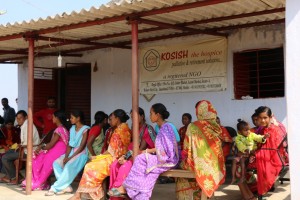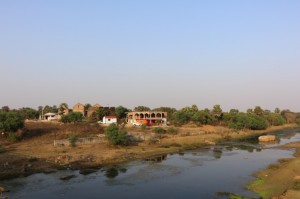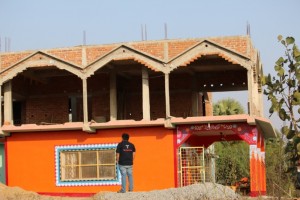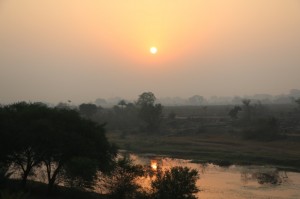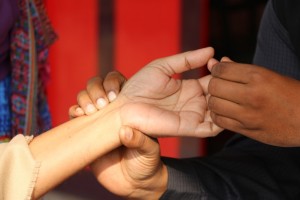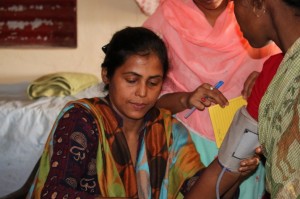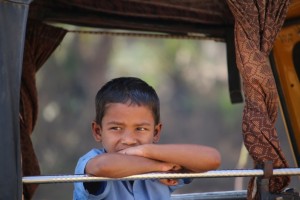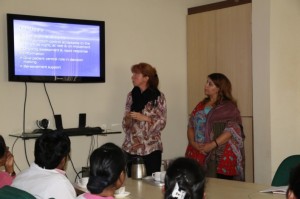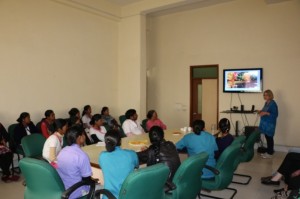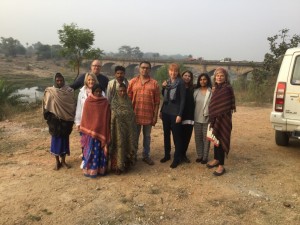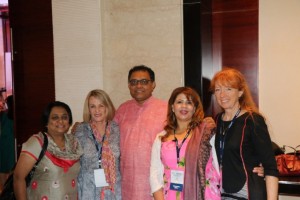– Karen Anderson, Lecturer & Unit Coordinator, Edith Cowan University
In the December 2015 Issue of the Australasian Palliative Link International Newsletter, Dr Odette Spruyt wrote of her personal experience of her mother’s passing in April 2015. For Odette, knowing her beloved mother died according to her own wishes and with dignity brought Odette comfort in her bereavement. In the same Newsletter edition Dr Anil Tandon introduced himself as the incoming Chair of the Australasian Palliative Link International as well as writing about Project Hamrahi and the heat and dust during his adventures in Rajasthan. Included again in the same Newsletter was an article by Dr Abhijit Dam, the Director of Kosish the Hospice and an invitation for readers to attend the first ever ‘Kosish the Hospice Self Care Retreat’. I read it with much interest and after a discussion with Tracy Robinson, Clinical Nurse Consultant at the Sandalwood Ward at Glengarry Hospital in Perth’s northern suburbs I decided I’d love to visit Kosish the Hospice, meet Dr Abhijit Dam and learn more about his notion of compassion and the work he is pioneering with taking palliative care to the poor in remote and rural parts of India.
Sunday – local villagers attending the free weekly clinic mostly for women and the elderly.
Using a psychotherapeutic term, those of us working in palliative care and with the elderly provide ‘containment’ and ‘holding’ to our patients and clients, their family members and loved ones. In my work as a counsellor in psycho-oncology and palliative care this is mostly directed at emotional and psychological containment. To provide such containment to others requires each one of us to ensure we care for ourselves. Self-care is not a luxury or an additional task, when working in palliative care. It is an essential professional responsibility so as to ensure we can ‘be present’ for and with others. The opportunity to participate in a first ever ‘Self-Care Retreat at a Hospice’ in India piqued my interest and felt like a balm for my soul.
Kosish the Hospice in February 2016
Whilst continuing to work professionally in my private practice and as an academic at Edith Cowan University, throughout the previous ten years I’d been primary carer for my severely intellectually disabled sister as she endured multiple critical health issues as well as for each of my aging parents in their 90s as their own health declined. Eventually this culminated with me being present as each of my beloved family members died. Both my sister’s body and my father’s body had gone to medical research at the University of Western Australia respectively in 2011 and 2014. My father was cremated in July 2015, and my sister in September 2015. In early December I made my decision to register for Dr Abhijit Dam’s ‘Self Care Retreat at Kosish the Hospice’ and was filled with excitement at the prospect of a new adventure to a different part of India I’d not yet visited. Just two days after making my decision and informing my 93 year old mother, she fell badly in her aged care facility, was taken to emergency where I joined her in the early hours of the morning and where she died within four hours. Her death came quickly in the end. Her funeral and cremation was held on 18th December 2015. The final 6 months of 2015 will always remain as a significant period in my life. I include this personal detail in the hope that those reading this appreciate that as health professionals working so closely with the terminally ill and with the elderly, we too have personal lives, families and loved ones for whom we care. We do need to balance our own care as we offer care to our patients and clients as well as to our own loved ones.
Morning sunrise at Kosish the Hospice
Life is a magnificent tapestry of colourful events and experiences. We never do know what is before us. Our professional work regardless of the roles we function in, demands that we step into ‘the unknown’ every day we go to work. Thus it is wise for us to ‘walk our talk’ and to practice what we promote to our patients and clients – to actively apply self-care. If we are to demonstrate compassion with others in a professional capacity then we quite simply must practice experiencing compassion towards ourselves. As Odette experienced earlier in 2015 and similarly myself at the year’s end, there has been enormous value and comfort in knowing my sister, my father and my mother each benefitted from receiving the most professional medical, nursing and allied health support available in our fortunate country. Here in Australia my loved family members each retained their individual dignity and wishes as they were cared for, in hospital and at home, with great love and sincere respect. With this as my personal context I travelled to India and to Kosish the Hospice with an open heart filled with compassion and eager to learn from different contexts and to converse with others more about life and death and their myriad of meanings.
Taking of a pulse Ayurveda style
Usha working at the Kosish the Hospice Sunday weekly clinic
In preparing us for the visit Dr Abhijit Dam emailed each of us on several occasions requesting we ‘come with an open heart filled with compassion’. As participants, we three Western Australians – Tracy Robinson, Clinical Nurse Consultant, Cheryll Fredericks, Senior Nurse, both working at the Sandalwood Palliative Care Ward at Glengarry Hospital, and myself plus two Americans – Christopher Paquette from Philadelphia and Carol Clark from Boston, together with the sixth member at the retreat, Dr Ranjan Singh, Consultant Anaesthesiologist & Critical Care, who drove almost 150 kilometres from the Brahamananda Naryana Hospital to Kosish the Hospice, certainly ventured to our destination with hearts open for a new and different experience. We were not disappointed despite any personal challenges we may have encountered.
Dr Abhijit Dam welcomed us before we even left Australian soils. His emails impressed me with the warmth and honesty of what he was offering – to come and view his establishment in its early development and not yet as a finished facility as well as to witness his work as he practiced providing palliative care to the poor in regional India. For us three Western Australians arriving at Kolkata Airport at 10.30pm, after leaving our homes at 3.00am earlier that day, meeting our driver who spoke little English and then driving for 7 hours through the night was a memorable introduction to India for sure!! Anil’s description of the dust and the bumpy roads became evident almost immediately as we drove out of Kolkata and hit the road so to speak winding north east towards Jharkhand.
Existential psychotherapist, Dr Irvin Yalom (1998) comments, ‘…this approach, “existential psychotherapy,” defies succinct definition, for the underpinnings of the existential orientation are not empirical but are deeply intuitive’. Yalom clearly explains his definition: ‘Existential psychotherapy is a dynamic approach to therapy which focuses on concerns that are rooted in the individual’s existence’ (1998, 170). Thus each person’s process of dying and their moment of death form an essential part of their unique existence. I carried within me the notions proposed by Yalom that there are four ultimate concerns each individual will face at various times in their life. The four ultimate concerns include: death, freedom, isolation and meaninglessness. All four of these ultimate concerns are not only associated with end of life but may present during any of life’s challenging events. Our precious time spent at this inaugural Self Care Retreat provided ample opportunities in a quiet place and in a slowed down pace, to contemplate and share engaging conversations indirectly discussing these four ultimate concerns. In particular to consider these within the poignant context of India – a country possessing a myriad of diverse contrasts was food for our souls.
Village boy quietly observing the visitors at Kosish the Hospice
Tracy Robinson and Cheryll Fredericks presenting at the Curie Abdur Razzaque Ansari Cancer Institute in Ranchi
Karen Anderson presenting at the Curie Abdur Razzaque Ansari Cancer Institute in Ranchi
With time out and away from, our regular intensive work and hectic work schedules and workplaces, space to go quietly within oneself enabled each participant to reflect upon both their professional and their personal ‘self’. The process was made even more productive with the magnificent food stunningly prepared by Usha according to Ayurveda principles. The food was an attraction for all of us. Such fresh produce grown locally and prepared just prior to eating was delightfully flavoursome. I miss Usha’s cooking so much as I’m sure the other retreat participants equally do.
Dr Abhijit Dam uses the phrase, ‘Tat Thami Asi’. It is Sanskrit which translates as, ‘That art thou’, ‘That thou art’, ‘Thou art that’ – ‘That you are’ or ‘You are that’. The meaning refers to ‘the self’ in its original, pure, primordial state. It is wholly or partially identifiable with the ‘Ultimate Reality’ which is the origin of all phenomena. The days spent at Kosish the Hospice as we partook of the different activities – introductions to Ayurveda medicine and lifestyle principles; yoga; meditation; indulgent massages; visits to historical ruins; local villages and marketplaces as well as to the Curie Abdur Razzaque Ansari Cancer Institute in Ranchi, the capital city of Jharkhand; observing clinics in practice; interacting with village children; watching the local wild life and especially the delightful monkeys playfully carry out their daily routines, the Kosish latest breed of cute puppies and the majestic rooster; listening to the spirituality of music, drumming and singing exquisitely preformed; watching the spectacular sunrises and sunsets; and simply sharing the routines of a day – made for a unique life enhancing and memorable cultural exchange. From morning rising to the day’s quiet end we contemplated the universal question, ‘Who am I?’ as each of us spent time in the presence of being with our own ‘ultimate reality’.
The friendliness, sincere and heartfelt care and nurturance provided by Dr Abhijit Dam, Usha Rani Mohanty and their wonderful staff – Mahato, Balli and Lakhhi – is now etched upon each of our hearts and minds. The days spent at Kosish the Hospice provided each participant with the space to go quietly within to reflect upon not only their practice within the field of palliative care, psycho-oncology and working with the elderly, but to meet with themselves and their own personhood. In doing so we were able to, whether consciously or unconsciously, inevitably reflect upon Yalom’s four ultimate concerns of death, freedom, isolation and meaninglessness.
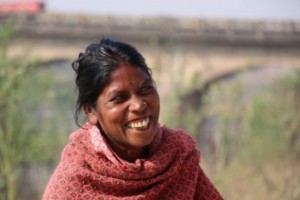 Lakhhi – staff member at Kosish the Hospice
Lakhhi – staff member at Kosish the Hospice
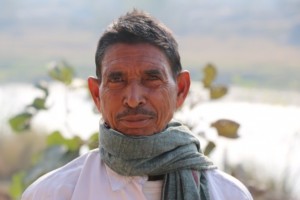 Mahato – staff member at Kosish the Hospice
Mahato – staff member at Kosish the Hospice
Kosish the Hospice is a truly remarkable innovative concept still in its early stages of development. More work is required to complete the total building complex and thus a regular funding source is necessary and is in the process of being sought. Some folk may find the location, the facility and or the resources limiting. But this too adds to the uniqueness and the richness of what we experienced In February 2016. We were invited in to share the vision of one man and his close colleagues who are pioneering introducing the concept of providing palliative care to the terminally ill and elderly into some of the poorest and most remote areas of India. This is an endeavour which I now firmly support, and endorse. It’s a project which all of us as participants in the first such ‘Self Care Retreat at Kosish the Hospice’ actively want to commit to in whatever way we can. It’s one thing to provide palliative care where resources and funding are readily at hand even when such funds may be limited. It’s a whole different challenge attempting to educate for, and to advance palliative care services to those living in poorer remote and rural regions of India wherein access to medical resources is extremely compromised.
Ready to depart Kosish the Hospice after a wonderful cultural exchange of contexts, conversations and compassion
Upon departing Kosish the Hospice, we three Western Australians thoroughly enjoyed the excitement of exploring just a little of Kolkata and New Delhi before spending time travelling in beautiful Rajasthan. We then flew to Pune and attended the IAPCON Pune2016 conference. With over 700 participants from around the world the Indian Association of Palliative Care Conference 2016 delivered a broad collection of topics, including both research-based and practice-based presentations. The conference was superbly organised and allowed for a vast array of stimulating conversations and encouraged excellent networking. I felt I learned and gained a great amount and I look forward now to attending future conferences. I curiously noted less coverage of aspects relating to bereavement, existential psychotherapy, reflective practice and in particular the use of Balint Groups and supervision. All these form important components when engaging, educating, empowering and excelling in palliative care. Hopefully some of these will be included in future IAPC conferences.
Continuing to educate and advance understanding for the value of palliative care services at all levels within not only Indian society but within our global society, is substantively worthwhile. This is particularly and urgently needed in regards to increasing support for the pioneering work and efforts of people such as Dr Abhijit Dam, Usha Rani Mohanty and others who are endeavouring to take palliative care to the poor in rural and remote areas of India. The challenges encountered in India are not dissimilar to what we face here in Australia with delivering palliative care services to those living in our own remote and isolated regions and mores specifically with our Aboriginal peoples. There is much work yet to do and it is exciting to be involved.
IAPCON Pune 2016 Conference – Dr Priyadarshini Kulkarni, Karen Anderson, Dr Abhijit Dam, Cheryll Fredericks and Tracy Robinson.
Reference:
Yalom, I.D. (1998). The Yalom Reader: Selections from the Work of a Master Therapist and Storyteller. New York: Basic Books

